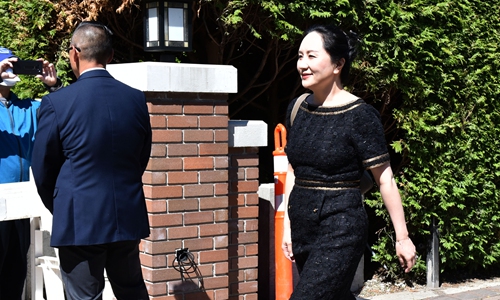Meng ruling by Canadian court outrageously wrong
By Liu Dan Source:Global Times Published: 2020/5/28 10:57:18

Huawei Chief Financial Officer Meng Wanzhou leaves her Vancouver home on May 27, 2020 to appear in British Columbia Supreme Court. Photo: AFP
Canadian judge Heather Holmes ruled Wednesday (Canadian local time) that the case of Meng Wanzhou, chief financial officer of Chinese high-tech giant Huawei, meets the threshold of "double criminality", opening the way for her extradition to the US. The ruling irritated many Chinese people who have been paying close attention to the Canadian court's decision.
Since Meng was arrested in December 2018 by Canadian police at the request of the US during a flight stopover in Canada, the case has undergone several rounds of extradition hearings over the past one year and a half. Meng's unfair ruling is quite disappointing.
The ruling is a failed judgment. It has deeper implications.
First, although Canada claims to insist on judicial independence, it cannot independently make a fair judgment, as it is afraid of US hegemony and pressure. This is a political, legal and diplomatic failure for Canada.
Second, Canadian Prime Minister Justin Trudeau retained power in the election, but he is now leading a minority government. Under pressure from opposition parties in the country, he has chosen to be tough on China. The Canadian government has made a wrong decision without taking into consideration the country's and Canadians' interests. This is a failure for the federal government and the Canadian people as a whole.
Third, the China-Canada relationship reached the freezing point due to the Meng case, and it will fall into greater predicament thanks to the latest ruling. It is a failure Canada must bear in its relations with China.
It is well known that the Meng case was tainted by the Trump administration's interests, and that Canada has foolishly chosen to be caught up in the middle of the two largest powers in the world. Both China and Canada have been victims of US hegemony.
Now that Canada has failed to solve the case fairly and properly, there's little or even no hope for China-Canada relations to walk out of the quagmire. Bilateral relations may have to face shrinking room for future development.
As the COVID-19 pandemic rages on, China and Canada have conducted constructive cooperation on vaccine development and research, which will make contributions to the entire world and all humanity. Canada is competing against Norway and Ireland for the two nonpermanent UN Security Council seats. The country's achievements in global public health governance will become its advantage in the competition. However, it is now becoming uncertain whether China and Canada can withstand the negative influence of the Meng case to continue cooperation in the virus fight.
In the areas such as energy, trade and environmental protection, China and Canada are supposed to have great potentials for cooperation. Take trade. The two countries had conducted feasibility negotiations on a free trade agreement, the process of which has bogged down because of the Meng case. In the long run, the prospect for the two countries to resume their good foundation for trade cooperation is now dim.
The Huawei 5G issue is another test for China-Canada relations. So far, as a member of the Five Eyes intelligence alliance, Canada hasn't followed the US to ban Huawei in its 5G rollout. Whether Canada can keep its stance or will surrender to US pressure, as it did with the Meng case, will influence whether the already strained relationship will come to a full head.
The author is a research fellow with the Center for Canadian Studies, Guangdong University of Foreign Studies. opinion@globaltimes.com.cn
Posted in: VIEWPOINT